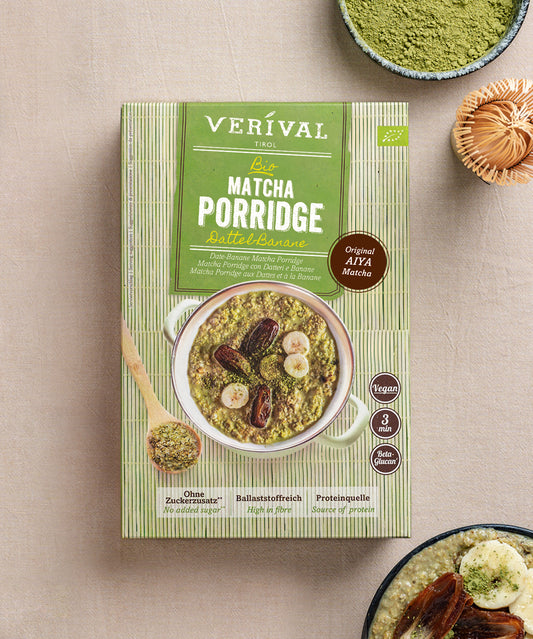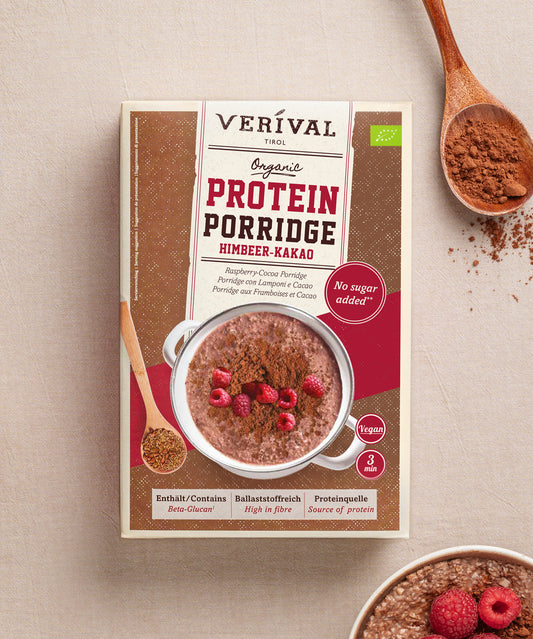The right diet for irritable bowel syndrome is a key issue for many sufferers, as what we eat can have a noticeable effect on symptoms. Flatulence, abdominal pain, diarrhoea or constipation often occur without any organic cause and make everyday life challenging. In this article, you will learn which foods are well tolerated by irritable bowel syndrome sufferers, what you should avoid and how you can adjust your diet step by step.
Gut-friendly porridge for breakfast – here's how!
What is irritable bowel syndrome?
Irritable bowel syndrome, or IBS for short, is a functional disorder of the bowel. This means that despite sometimes severe symptoms, no structural changes in the digestive tract can be detected. Typical symptoms include recurring abdominal pain, flatulence, bloating or changes in bowel movements. These can take the form of diarrhoea, constipation or a combination of both. Women between the ages of 20 and 50 are particularly affected. The exact causes are not fully understood. A disturbed gut-brain axis, altered intestinal flora and increased sensitivity of the intestine are suspected.
How is diet related to irritable bowel syndrome?
Many sufferers report that their symptoms are related to certain foods. This is no coincidence: if you have a sensitive gut, certain food components can cause flatulence or pain more quickly. This is often caused by fermentation processes in the gut that produce gas. Fat, sugar alcohols and fibre can also cause symptoms in people with sensitive digestive systems. However, this does not mean that you have to cut out everything. It is much more important to identify your personal triggers and adjust your diet accordingly.
These foods can exacerbate symptoms
Not everyone reacts the same way, but there are some food groups that particularly often cause problems for people with irritable bowel syndrome. These include, for example, flatulent vegetables such as onions, garlic, cabbage and leeks. Legumes such as lentils and beans are also difficult to digest and can lead to increased gas formation. Dairy products containing lactose, sugar alcohols such as sorbitol (found in chewing gum or diet products), very fatty foods, alcohol and coffee are also often poorly tolerated. Raw foods can also cause many symptoms, especially in large quantities or late in the day.
These foods are usually well tolerated
Irritable bowel syndrome does not mean that you can only eat dry bread. There are many foods that are well tolerated and can even soothe the intestines. Cooked vegetables such as carrots, courgettes, spinach or pumpkin are often easier to digest than raw vegetables. Cooked potatoes, rice, oatmeal or millet are also gentle on the digestive system. Bananas, ripe pears or blueberries are considered to be well-tolerated fruits. Lactose-free dairy products or small amounts of plant-based alternatives may also be an option. Especially in the morning, it is worth having a breakfast that is gentle on the gut, such as warm porridge made from gluten-free oats. Try our basic recipe for porridge and enhance your breakfast with easily digestible toppings such as ripe pears, bananas or blueberries. Alternatively, Verival porridges are also a practical and easily digestible choice.
Breakfast recipe for irritable bowel syndrome: porridge
Here is a simple recipe for the popular porridge, which has become an indispensable part of most breakfast tables.
Preparation time: 2 mins
Leave porridge to stand: 3 mins
Total time: 5 mins
Calories: 320 kcal
Ingredients
- 250 ml milk or a plant-based alternative for vegans (oat milk, almond milk, soya milk, etc.)
- 50 g oat flakes (grams of oat flakes)
- 1 pinch of salt
- 2 tsp agave syrup (optional)
- 1/2 tsp cinnamon (optional)
Preparation
- Bring the oat flakes, pinch of salt and sweetener of your choice to the boil in the milk or plant-based drink (preferably stirring constantly). Another option is to cook the cereal flakes in hot water only.
- Leave the porridge to stand for 3 minutes. Pour the porridge into a bowl and sprinkle with cinnamon.
- Enjoy!
FODMAP diet: what's behind it?
In nutritional medicine, the so-called low FODMAP diet has established itself as an effective approach to irritable bowel syndrome. FODMAP stands for fermentable oligo-, di- and monosaccharides and polyols. In short: certain types of sugars and alcohols that ferment easily in the intestine and can cause discomfort. In the first phase of the diet, these substances are consistently avoided. They are then gradually reintroduced to find out what each individual can tolerate. The FODMAP diet should ideally be carried out under the guidance of a nutritionist, as it can otherwise quickly lead to an unbalanced diet.
How to successfully change your diet in everyday life
Changing your diet can be a challenge, especially if you have irritable bowel syndrome. The key is to take a structured and patient approach. These steps will help you integrate a tolerable diet into your everyday life:
1. Start with a food diary
Before you change your diet, it is a good idea to keep a food diary. For two to three weeks, write down what you eat and drink, what symptoms occur and how severe they are. The time of day and special circumstances such as stress or lack of sleep can also play a role. This will help you identify whether certain foods regularly cause symptoms or whether other factors are involved. You can keep the diary in the traditional way with pen and paper or using an app. The most important thing is to keep it regularly and as completely as possible. On this basis, targeted and individual adjustments can be made.
2. Focus on foods that are well tolerated
Don't start by cutting things out, start by building things in. Specifically incorporate foods that are generally well tolerated. These can be cooked vegetables such as carrots or courgettes, as well as potatoes, rice, oatmeal or ripe bananas. Pay attention to how you feel after these meals.
3. Pay attention to preparation and eating habits
Prepare your meals as gently as possible, for example by boiling or steaming. Avoid foods that are very fatty or heavily spiced. Chewing aids digestion, so take your time when eating. Regular mealtimes also often have a calming effect on the gut.
4. Change only one aspect at a time
If you want to try something new or leave something out, always change only one thing at a time. This will help you to better assess whether a particular ingredient is good for you or causes discomfort.
5. Plan your meals in advance
Spontaneous decisions often lead to ill-considered eating. A simple weekly plan with easily digestible recipes will help you to feel more confident and avoid stress when cooking. Prepared snacks for on the go can also be helpful.
6. Stay flexible and patient
Every body reacts differently. It is normal to need a few attempts before you know what is really good for you. Avoid rigid rules and try to see the change as a process, not a short-term solution.
7. Get support if necessary
If you are unsure or your symptoms persist despite making adjustments, it may be helpful to seek professional advice from a dietitian. They can provide you with targeted guidance and support in finding a balanced and tolerable diet.
Common mistakes in the diet for irritable bowel syndrome
A common mistake is to avoid entire food groups without a sound basis. For example, those who avoid all carbohydrates or restrict their diet extremely over a long period of time risk nutrient deficiencies and a deterioration in their quality of life. The FODMAP diet is also sometimes implemented incorrectly. For example, food groups are avoided for too long without being reintroduced into the diet. Equally problematic is the fear of eating: those who constantly worry about eating the wrong thing often experience a worsening of their symptoms. It is therefore important to take a relaxed and individual approach to nutrition.
When to seek professional help
If symptoms persist despite dietary changes or if new symptoms appear, medical advice should be sought. Medical clarification is also important in cases of weight loss, bloody stools or night-time pain in order to rule out serious illnesses. A gastroenterological examination and, if necessary, support from a dietitian may then be the next step.
Conclusion: Diet as the key to relief
The right diet can make a decisive difference in irritable bowel syndrome if it is individually tailored and suitable for everyday use. Every intestine reacts differently, and that is precisely where the challenge lies. With a little patience and mindful attention to your own body, many symptoms can be noticeably alleviated.
Discover a compatible breakfast from Verival!
Frequently asked questions
What should you definitely not eat if you have irritable bowel syndrome?
Vegetables that cause flatulence, such as onions or cabbage, sugar alcohols such as sorbitol, high-fat foods, coffee, alcohol and large amounts of raw food are often problematic. However, which foods trigger symptoms can vary from person to person.
What foods should you eat if you have irritable bowel syndrome?
Cooked vegetables such as carrots or courgettes, potatoes, rice, oatmeal, millet and ripe, soft fruits such as bananas or pears are usually well tolerated. Lactose-free dairy products can also be a good option.
What foods calm the gut?
Gently prepared, easily digestible foods such as steamed vegetables, mild grains and ripe fruit can relieve and calm the gut. Regular, relaxed meals also help to alleviate symptoms.
























